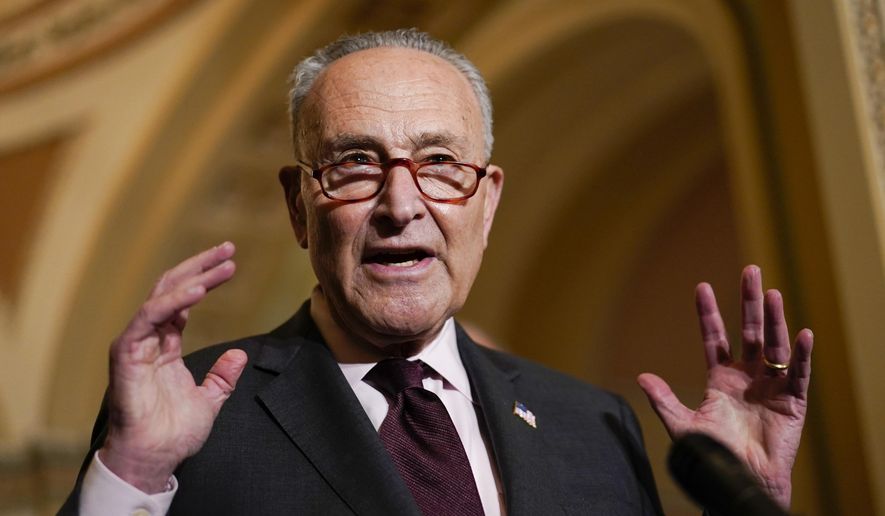Senate Majority Leader Charles E. Schumer threatened Monday to gut the filibuster if Republicans don’t back the White House’s overhaul of the nation’s voting laws.
Mr. Schumer, New York Democrat, wrote in a letter to colleagues that he would force a vote on changing the Senate’s long-standing rules by Jan. 17 unless Republican lawmakers help pass the partisan voting bill.
“The Senate must evolve, like it has many times before,” Mr. Schumer wrote. “The Senate was designed to evolve and has evolved many times in our history. … The fight for the ballot is as old as the Republic.”
Since President Biden took office last year, Democrats have been pushing an ambitious rewrite of the country’s voting laws. The bill Mr. Schumer plans to put up for a vote this month would rework campaign finance laws, expand mail-in voting and impose new restrictions on the ability of states to draw electoral districts.
The bill failed in the evenly split Senate three times last year, always falling well short of the Senate’s 60-vote filibuster threshold. Democrats now are threatening to end the filibuster if Republicans don’t relinquish their opposition.
“Over the coming weeks, the Senate will once again consider how to perfect this union and confront the historic challenges facing our democracy,” Mr. Schumer wrote. “We hope our Republican colleagues change course and work with us.”
Republicans say Mr. Schumer’s threats show that Democrats are desperate to win at all costs, even if it means changing the Senate’s rules to their advantage.
“An evenly divided Senate breaking and forever changing rules that require a supermajority is like a football team declaring its opponent’s end zone starts at the 40-yard line,” said Sen. Mike Lee, Utah Republican.
Democrats are weighing several proposals for bypassing or jettisoning the filibuster outright to pass the voting measure.
Some lawmakers are pushing for a one-time filibuster exemption just to pass the election legislation, but others want a more radical change in how the Senate operates.
Along those lines, there is talk of changing the filibuster rule to require 41 “no” votes for continuing debate rather than 60 “yes” votes for ending debate.
Some lawmakers have floated a requirement that senators mount an old-fashioned “talking filibuster,” which would require lawmakers to speak continuously on the floor in objection to a bill. Senators currently are allowed to merely object to ending debate, forcing leaders to round up the votes necessary to overcome the 60-vote threshold.
SEE ALSO: Schumer vows Build Back Better votes in the new year, wants to put senators on the record
Mr. Schumer has issued his threat during the same week that former Senate Majority Leader Harry Reid will lie in state at the U.S. Capitol. The Nevada Democrat died in late December at the age of 82.
Some lawmakers note that Mr. Reid’s career is a stark reminder of how altering the Senate’s rules could result in a spectacular backlash: Mr. Reid weakened the filibuster in 2013 by changing the Senate rules to stipulate that only a simple majority of 51 votes is required for judicial nominees.
That change allowed President Trump to nominate and confirm three Supreme Court justices along party lines, shifting the makeup of the nation’s highest court to the right.
Citing that outcome, Senate Minority Leader Mitch McConnell, Kentucky Republican, has warned that any effort to weaken the filibuster will launch a new era of partisan warfare.
“Entire generations of statesmen would have seen … these unhinged proposals as armageddon for our institutions,” Mr. McConnell. said. “Lashing out at our democracy … and at the Senate itself is not going to solve anything.”
For any effort to succeed, Democrats will have to invoke the “nuclear option,” a parliamentary procedure that allows the chamber to override its long-standing rules and traditions by a majority vote. It remains uncertain whether all 50 Democrats would fall in line with the move.
The key to unlocking a rules change is Sen. Joe Manchin III, a moderate West Virginia Democrat. His support, with that of every other Democratic senator, would allow the majority to push through the change, with Vice President Kamala Harris casting the tiebreaking vote.
Mr. Manchin has not specified whether he is on board with the filibuster carve-out, but he has held talks with Democrats and Republicans on what changes need to be made to make the Senate operate better.
In addition to Mr. Manchin, Democrats also must persuade Sen. Kyrsten Sinema to back the rules change. The Arizona Democrat has supported the filibuster and expressed skepticism about the rules change.
“Sen. Sinema has asked those who want to weaken or eliminate the filibuster to pass voting rights legislation, which she supports, if it would be good for our country to do so,” said John LaBombard, the senator’s communications director.
Mr. LaBombard said Ms. Sinema also believes it is “time for the Senate to publicly debate its rules, including the filibuster, so senators and all Americans can hear and fully consider such ideas, concerns, and consequences.”
• Haris Alic can be reached at halic@washingtontimes.com.




Please read our comment policy before commenting.